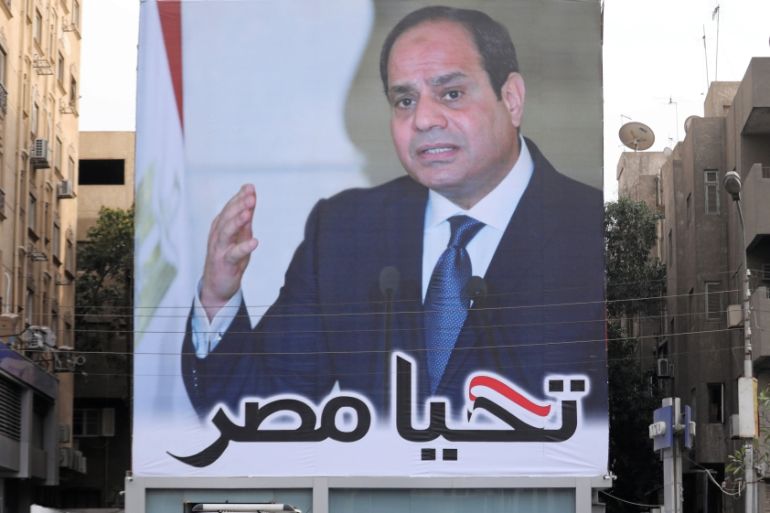Egypt’s Sisi: Defaming security forces is ‘high treason’
President’s warning comes amid controversy over a BBC investigation into alleged rights abuses by security forces.

Egypt’s President Abdel Fattah el-Sisi warned on Thursday he considers defamation of the country’s armed forces and police an act of “high treason” that wouldn’t be tolerated.
In televised comments during a visit to the Mediterranean coastal town of Alamein, he reminded viewers of the hundreds of soldiers and police officers killed by armed groups in recent years.
Keep reading
list of 4 itemsGeorgia advances ‘foreign agents’ bill as 20,000 rally against it
Lawmakers brawl as Georgian Parliament considers ‘foreign agent’ bill
Journalist loses foot after being badly wounded in Israeli attack in Gaza
“If anyone defames them, he is defaming all Egyptians. It’s no longer a question of freedom of speech,” said Sisi, a former general who led the military overthrow of elected president Mohamed Morsi in 2013.
“No one defames the army and police while I am here.”
Sisi’s comments came a day after a call by Egypt’s top prosecutor, Nabil Sadek, for legal action against news outlets that publish “false news, statements and rumors”.
“[The decision comes] in light of recent attempts by the forces of evil to undermine the safety and security of the nation by broadcasting and spreading lies,” Sadek said in a statement.
|
|
Fabricated sources?
Foreign Minister Sameh Shoukry criticised the British broadcaster BBC on Tuesday for recent reporting on human rights in the country.
“It is … regretful to notice lack of professionalism in the performance of some media outlets, which base their coverage on fabricated sources, for political purposes, or in search of scoops,” he said.
“This was the case in BBC’s last week report on Egypt, where the girl – who was alleged as forcibly disappeared and tortured – appeared on screens refuting such claims.”
The State Information Service accused the BBC of spreading false information and demanded an apology “refuting the professional errors and violations, as well as the allegations on the situation in Egypt”.
BBC published a short documentary on February 23 purporting to show human rights violations in the North African country.
It gave detailed account of arrests, forced disappearances, torture, and sexual violence as recounted by victims and their families. Egyptian authorities called the reporting “flagrantly fraught with lies”.
Hatem Azzam, a former member of Egypt’s parliament and a human rights advocate, said in a tweet the BBC story exposed practices that have become all too common.
The BBC report shed the light on the systemic enforced disappearance and torture in Egypt that is becoming real life normal practice. It should awake the human consciousness how many Egyptian”Giulio Regeni” like can be there or waiting to be @OrlaGuerin @BBCWorld @BBCOurWorld https://t.co/hC0Q6EWA3k
— Hatem Azzam (@HatemAzzam) February 27, 2018
A BBC spokesperson said the organisation stood by “the integrity” of its reporting teams.
The Egyptian government has increased its crackdown on media workers since Sisi seized power, including against Al Jazeera Media Network staff.
Mahmoud Hussein, an Egyptian national who works for Al Jazeera Arabic in Qatar, has been jailed without charge since December 2016.
Hussein, 55, was accused of “incitement against state institutions and broadcasting false news with the aim of spreading chaos”, allegations he, his lawyers, and Al Jazeera strongly deny. He has been held in the notorious Tora maximum-security prison and suffers from physical injuries and severe psychological duress.
Egypt ranks third in the world in terms of journalists arrested with 24 media workers held in detention. Since 2011, 10 journalists have been killed without proper investigations being conducted, according to the Office of the United Nations High Commissioner for Human Rights.